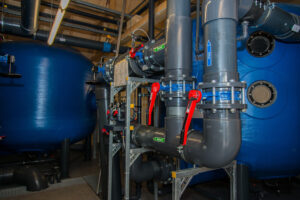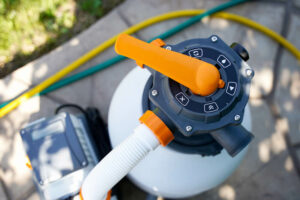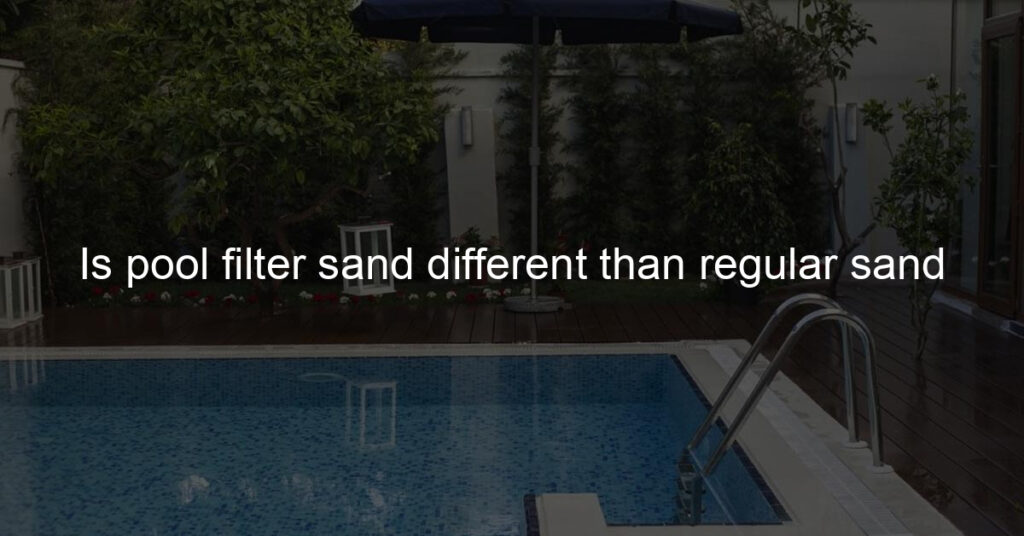Is Pool Filter Sand Different Than Regular Sand
Have you ever gazed into a crystal clear swimming pool and wondered about the unseen heroes working behind the scenes? One such hero, often overlooked, is pool filter sand, a substance far different from the regular sand found at your local beach or playground.
In this comprehensive examination, we will venture into the fascinating world of pool filter sand, examining its unique properties, its pivotal role in maintaining pool cleanliness, and the dangers of using its regular counterpart as a substitute.
So, prepare to embark on a journey that will have you rethinking your next handful of sand, whether at the beach or in your own backyard.
Understanding the Basics: What is Pool Filter Sand?
Pool filter sand is a specialized type of sand that’s used in sand filter systems for swimming pools. Unlike regular sand, it has been carefully graded and washed to a specific size, typically between 0.45 and 0.55 mm in diameter.
This ensures that it’s the right size to filter out particles from the water in your pool without getting washed through the system itself. The sand is usually made from silica, a substance found in quartz, which makes it chemically inert and able to resist the corrosive effects of chlorine and other pool chemicals.
Regular Sand: A Broad Overview
Regular sand, on the other hand, is what you’d find on beaches, in deserts, or at the local playground. It comes from a wide variety of sources, including eroded rocks, marine organisms, and volcanic material. Regular sand has a broader range of grain sizes and might contain a variety of different mineral types, depending on its source.
Unlike pool filter sand, it hasn’t been processed to ensure uniform size or chemical composition. As such, it’s not suited to the task of filtering your pool water.
Comparison: Physical Properties of Pool Filter Sand and Regular Sand

At a glance, pool filter sand and regular sand might look quite similar. Both are granular materials that can range from white to yellowish-brown in color. However, upon closer inspection, differences begin to emerge.
The grains of pool filter sand are typically more uniform in size and shape, which allows them to effectively filter out particles from water. Regular sand, on the other hand, can have a much wider range of grain sizes and shapes, which can compromise its filtering capabilities.
Moreover, pool filter sand’s grains are typically sharper, while regular sand grains are often more rounded due to erosion.
Chemical Composition: Understanding the Differences
Pool filter sand is almost entirely composed of silica (quartz), which makes it chemically stable and resistant to wear. It doesn’t react with pool chemicals, and it’s able to withstand the constant flow of water without breaking down.
Regular sand, on the other hand, can contain a mix of different minerals depending on its source. It might contain quartz, but also feldspar, mica, or even organic material.
These different minerals might react with pool chemicals or break down more easily, leading to a less effective filter.
Purpose and Usage: Pool Filter Sand vs Regular Sand

The main purpose of pool filter sand is, as the name suggests, to filter out particles from pool water. It’s designed to sit in the filter tank of a pool’s pump system, where water is forced through the sand.
The precise size and shape of the pool filter sand’s grains mean they catch and hold onto small particles, leaving the water clean and clear. Regular sand, however, is used in a wide variety of applications, from construction and landscaping to playgrounds and beaches.
It’s not designed to filter water, and its variable grain size and mineral content make it unsuitable for this purpose.
Role of Pool Filter Sand in Maintaining Pool Hygiene
The use of pool filter sand is crucial for maintaining the hygiene and clarity of pool water. It operates by trapping tiny particles, including dirt, debris, and bacteria, between its grains as the pool water circulates through the filter.
This prevents these particles from re-entering the pool, thereby keeping the water clean and safe for swimmers. Without pool filter sand or an alternative filtration system, these particles would remain in the water, leading to cloudiness, potential chemical imbalance, and an increased risk of waterborne illnesses.
The Impact of Grain Size: Why it Matters
Grain size is a critical factor in the function of pool filter sand. The sand’s grains must be large enough to allow water to flow through, but small enough to trap particles.
If the grains are too large, particles will pass through the filter without being trapped. If the grains are too small, water will struggle to flow through, reducing the filter’s efficiency and potentially causing damage to the pool’s pump system.
Regular sand’s inconsistent grain size makes it unsuitable for pool filtration.
Durability and Longevity: Pool Filter Sand’s Advantage

In addition to its filtering capabilities, pool filter sand has a clear advantage in terms of durability and longevity.
Thanks to its high silica content and specific grading, it’s highly resistant to wear and can last for several years before needing replacement. Regular sand, with its mixed mineral content and lack of uniform grading, tends to break down much faster, especially under the mechanical stress of water filtration and exposure to pool chemicals.
Why Regular Sand Doesn’t Work in Pool Filters
While it may be tempting to consider regular sand as a cheaper alternative for pool filters, the results could be counterproductive. The inconsistent grain size of regular sand can cause it to compact in the filter, obstructing water flow and leading to poor filtration.
Additionally, regular sand is likely to contain impurities that can react with pool chemicals, causing cloudiness and chemical imbalances in the pool water.
Understanding the Hazards of Using Regular Sand in Pool Filters
Substituting pool filter sand with regular sand can lead to a variety of issues.
Firstly, the effectiveness of the filtration system would be compromised due to the irregular size and shape of the sand grains.
Secondly, the impurities present in regular sand might react with the chemicals in the pool, leading to discoloration or cloudiness.
Moreover, the pump system might be damaged due to the compacting of the sand, leading to expensive repairs or replacements. Lastly, the risk of waterborne illnesses could increase, as the pool’s water may not be adequately filtered.
Choosing the Right Sand for Your Pool Filter: A Buying Guide

Choosing the right sand for your pool filter is crucial for maintaining clean and safe pool water. You should look for sand specifically designed for use in pool filters, which is often labeled as “pool filter sand” or “pool grade silica sand”.
This sand should have a uniform grain size, typically between 0.45 and 0.55 mm, and be almost entirely composed of silica. Avoid using play sand, builder’s sand, or other types of a regular sand, as these will not perform effectively in a pool filter system.
Environmental Implications: The Eco-Friendly Choice
When considering the environmental implications of pool filter sand versus regular sand, pool filter sand tends to be the more eco-friendly choice.
This is large because pool filter sand lasts longer and needs to be replaced less often than regular sand, which reduces the demand for raw materials and energy used in processing.
Moreover, pool filter sand helps to keep pool water clean, reducing the need for chemicals and water replacement, both of which can have environmental impacts.
Maintenance Tips for Pool Filter Sand
Maintaining your pool filter sand is essential for its longevity and efficiency.
Regular backwashing, typically every 4-6 weeks or as per the manufacturer’s instructions, can help to clean out the accumulated debris in the sand. It’s also important to replace the sand every 5-7 years, or sooner if the pool is used heavily.
Regular checks for clumping or channeling, and signs that the sand might need to be replaced more frequently, can also help ensure your filter system is working efficiently.
Final Thoughts: Is Pool Filter Sand Really Different Than Regular Sand?
Pool filter sand is indeed quite different from regular sand, both in its physical properties and its purpose. The carefully graded and washed grains of pool filter sand is designed to filter out impurities from pool water, ensuring its clarity and safety.
While regular sand might seem a similar substance, its variable grain size, and mineral content make it unsuitable for use in pool filters. So, the next time you gaze into your sparkling clean pool, remember the silent work of the humble pool filter sand.
So, what have we discovered?
Pool filter sand is not just regular sand by another name. It’s a specially crafted material, fine-tuned for a particular job – to keep our swimming pools clean and hygienic.
Regular sand, though similar in appearance, doesn’t cut it when it comes to filtering our pool water. Its inconsistent size, varied composition, and inability to withstand the rigors of filtration can lead to problems. It can damage the pump system, result in unclean water, and require frequent replacements.
On the other hand, pool filter sand, with its uniform size and silica composition, is built to last and perform. It effectively filters out impurities and resists wear and tear, proving to be a dependable choice for our pool filtration needs.
The key takeaway? Not all sands are created equal. And when it comes to the health and cleanliness of our pools, pool filter sand undoubtedly earns its keep. So, next time you take a dip, take a moment to appreciate the unseen hero – the pool filter sand – working tirelessly to maintain that crystal-clear water.














